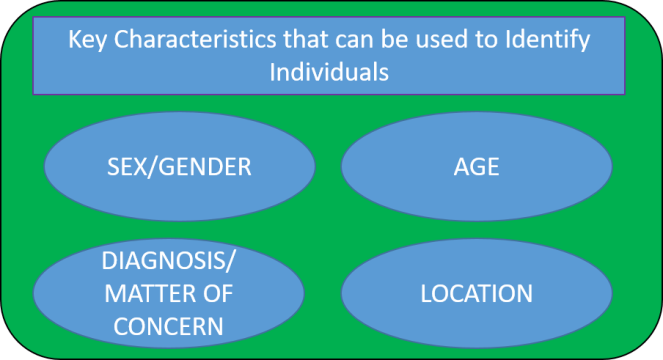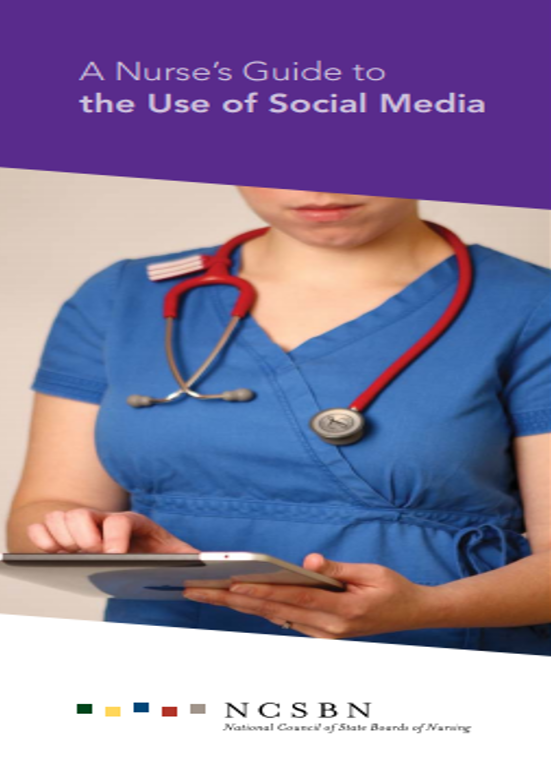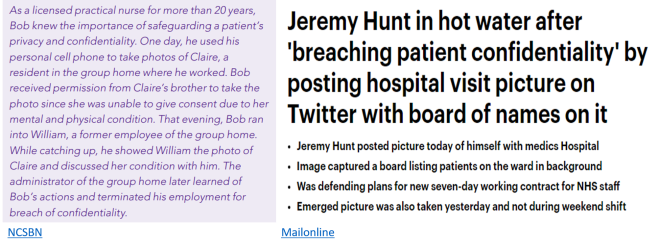For Topic 4 I have decided to focus my post on the ideas of confidentiality when professionals use social media. Perhaps they may be posting about their day or something that they experienced, and this may consequently break confidentiality. Key professions where this is likely to be an issue include healthcare professionals, the police and those in law professions, who have access to personal information that could help to identify individuals.

Figure 1: Key characteristics that can Reveal Someone’s Identity
Looking online for healthcare information is the third most popular use of the internet (Lachman, V. 2013), and with many healthcare professionals a part of social media, it’s easy to see how they may, often without thinking break confidentiality, when trying to help others, whilst at the same time fulfilling their moral obligations to help those in need. Consequently it’s important that there are guidelines and understood protocols for professionals when it comes to the use of social media.
In order to combat these issues, professionals such as nurses are issued with pamphlets and other materials that have been created based on investigations, and academic literature into the ethical issues of these professionals using social media networks, such as the one seen in figure 2.

Figure 2: One of many pamphlets created to help provide guidance to professionals when using social media (NCSBN).
In previous topics, we have explored how the digital world, and social media in particular can be of great benefit to professionals, by allowing them to share knowledge and ideas, and create connections and maintain relationships that may have never been possible previously. However emerging literature and debates online show that there is a fine line between what is acceptable for these professionals to post, and what isn’t, and in terms of maintaining confidentiality this is no different. Often employers do not have specific guidelines and rules when it comes to professionals using their personal phones and other technology to access social media outside of the workplace, and breaking confidentiality can have varying consequences, and also be carried out by a variety of individuals.

Figure 3: Two stories of breaching of confidentiality.
Consequently it is clear that although the use of social media can be incredibly helpful for professionals, it also needs to be used with extreme caution and care, as often things such as confidentiality can be broken without us even realising.
Word Count: 396
References
Lachman, Vicki D. 2013. Social Media: Managing the Ethical Issues. Medsurg Nursing; Pitman![]() 22(5) 326-9.
22(5) 326-9.
NCSBN. A Nurse’s Guide to the Use of Social Media.
Mathew, S. and Willgress, L. 2015. Jeremy Hunt in hot water after ‘breaching patient confidentiality’ by posting hospital visit picture on Twitter with board of names on it. Mailonline.
Lee, K. and Bacon, L. 2010. Social networking: confidentiality and professional issues. British Journal of Midwifery. 18(8) 533-534
Moorhead SA, Hazlett DE, Harrison L, Carroll JK, Irwin A, Hoving C. 2013. A New Dimension of Health Care: Systematic Review of the Uses, Benefits, and Limitations of Social Media for Health Communication. J Med Internet Res 15(4):e85
The Guardian. 2014. Twitter abuse: easy on the messenger.
Greenwald, G. 2014. Why Privacy Matters. TED Talk.
Ronson, J. 2015. How One Stupid Tweet Blew Up Justine Sacco’s Life. The New York Times Magazine.
Kelion, L. 2013. UK jumps up internet scoreboard as digital divide grows. BBC News.
Kleinman, Z. 2015. Who’s that girl? The curious case of Leah Palmer. BBC News.
List of Figure
Figure 1:Self made using Microsoft Word
Figure 2: NCSBN. A Nurse’s Guide to the Use of Social Media.
Figure 3:Self made using Microsoft Word
Hi Rebecca,
really interesting post this week. Your take on the ethical considerations required by healthcare professions really sparked my interest as it covered a hugely relevant topic in a unique way. As mentioned in the NCSBN pamphlet that you linked in your post, nursing can be an “emotionally charged” profession, therefore nurses may see social media as a personal thereputic outlet. Despite retaining patient confidentiality, examples of work discussions on social media have caused suspension to some nurses in the past however. A case of this is highlighted in the following nursing times article (https://www.nursingtimes.net/roles/nurse-managers/nurse-suspended-over-facebook-posts/5062854.article) in which a nurse was suspenspended for talking negatively of her superiors. Do you feel that it is justified that examples of job loss and suspension for nurses exist through the use of social media posts, despite adhering to the guides of patient confidentially? Or do you feel that as professionals, nurses should have a greater moral responsibility to monitor their social media adequately?
Thanks, David
word count: 159
LikeLike
Hi David
Thanks for taking the time to read my blog, and I’m glad it sparked your interest! As nursing and similar professions do deal with very sensitive and personal information in the workplace, it is only right that they should be subjected to tougher confidentiality agreements. I think that the questions that you pose are very difficult to answer, in that it depends on which side that you look at them from.
On one hand, like you have said she has broken no confidentiality agreements, but I don’t think that in this particular case it is why she has been suspended. In this case I think it’s more to do with making comments such as those about the students she will be dealing with, and displaying the profession as unprofessional via the pictures that she posted that led to her suspension. Consequently I do not believe that in this particular case it is a question of breaching confidentiality, but more due to being unprofessional, and making comments that I believe would not be tolerated in any workplace or profession.
Thanks
Rebecca
LikeLike
Hi Rebecca,
Thanks for your great response! I tend to agree with what you’re saying because no matter what your occupation is, there will always be some level of professional integrity required and therefore self-regulation of online content is something that should be adopted by all. As with most jobs, the prohibited use of inappropriate social media posts will not fall into the guides of the job description but should instead be something understood by common sense in order to protect your professional livelihood. With that being said, I also feel that in some cases employers will execute unfair dismissal of employees through social media content. As a result, I feel it perfectly acceptable to adopt multiple identities in order to avoid the issue.
Thanks again, David
LikeLike
Hi David
Thanks for responding!
Yeah I completely agree with the fact that some employers may ‘unfairly’ dismiss employees for their social media posts in our eyes, as we aren’t the ones who have built and put time into those companies, however I think it is important to remember that they have a certain image to maintain within the public, and adhere to guidelines on confidentiality. Consequently your suggestion of multiple identities may indeed be the answer to avoiding these tricky issues and concerns.
Thanks
Rebecca
LikeLike